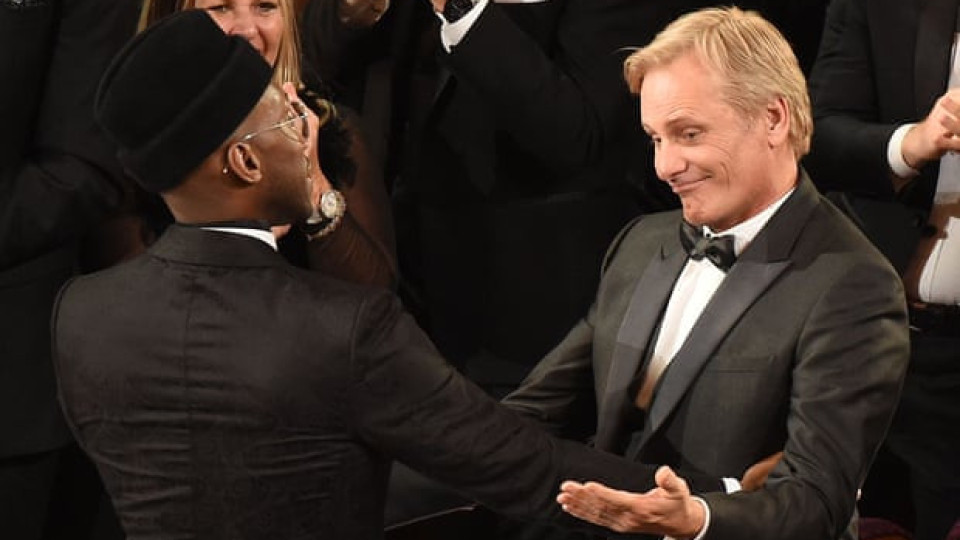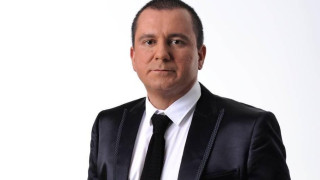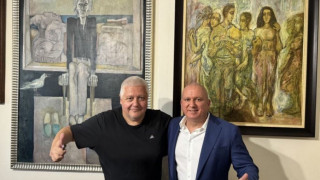
The feelgood comedy drama was a surprise big winner, while Olivia Colman and Rami Malek took home top acting honours
Oscars 2019 verdict: lovely surprises can’t compensate for shock horrors

Green Book has been named best picture in a surprise victory over Roma, during an Oscars ceremony that lacked a host but was filled with diversity and historic wins.
The feelgood comedy drama, starring Mahershala Ali and Viggo Mortensen and directed by Peter Farrelly, had been dogged by problems during awards season, and some people have questioned the veracity of its supposed true story, about the friendship between pianist Don Shirley and his chauffeur Tony Lip.
Ali also took home the award for best supporting actor, dedicating his win to Shirley, whose family have come out against the film’s portrayal of him. The actor, who also won for Moonlight in 2017, has become the first black man to win the best supporting actor award more than once. Green Book also won the Oscar for best original screenplay.
Roma, the intimate Netflix drama that many had predicted would make Oscars history as the first foreign-language best picture winner, took home three awards, including best director for Alfonso Cuarón. Cuarón’s younger years inspired the film, which tells the story of a domestic worker’s relationship with the family who employs her. “As artists, our job is to look where others don’t,” Cuarón said. “This responsibility becomes even more important at times when we are told to look away.”
Roma became Mexico’s first winner for best foreign language film, while Cuarón also picked up the award for best cinematography. The night was also a game-changing moment for Netflix, containing their biggest Oscar wins to date.
In the night’s other big shock, predicted best actress winner Glenn Close lost out to Olivia Colman for her role as Queen Anne in Yorgos Lanthimos’s dark comedy The Favourite. “It’s genuinely quite stressful,” she said, arriving on stage. “This is hilarious – I’ve won an Oscar!” She thanked co-stars Rachel Weisz and Emma Stone, naming them “the two loveliest women in the world to go to work with”. Despite The Favourite entering the night with 10 nominations, it was the only award given to the film.
Rami Malek was named best actor for playing Freddie Mercury in Bohemian Rhapsody, following on from a string of other wins this awards season. He is the first Arab American to have won the best actor Oscar. “I may not have been the obvious choice but I guess it worked out,” the Mr Robot star said during his acceptance speech. He failed to mention the film’s credited director Bryan Singer, who was removed from the project and who has since been accused of numerous counts of sexual misconduct and sex with minors – though he denies all claims and has called them “a homophobic smear”. Bohemian Rhapsody also won awards for best editing, best sound editing and best sound mixing, and the winners in all these categories also avoided mention of Singer.
Regina King picked up the best supporting actress award for her role in Barry Jenkins’ emotive drama If Beale Street Could Talk, beating Bafta winner Rachel Weisz. A tearful King paid tribute to both Jenkins and James Baldwin, whose 1974 novel the film is based on, calling him “one of the great artists of our time”.

The night began with a performance by Queen, led by Adam Lambert, before the arrival of Amy Poehler, Tina Fey and Maya Rudolph, who answered some burning questions for viewers. “There is no host tonight, there won’t be a popular movie category tonight, and Mexico will not be paying for the wall,” Rudolph said. The trio then offered up an all-too-brief tease of what it would have looked like if they had been hosting. Apart from Melissa McCarthy and Brian Tyree Henry, who dressed up in a combination of elements from the year’s best costume design nominees to give the award, the night was free from skits, and played straighter than usual.
It was a mostly apolitical night, without much mention of Donald Trump, although in presenting the award for best foreign language film, Javier Bardem started by saying, in Spanish: “There are no borders or walls that can restrain ingenuity or talent.” While accepting the award for best adapted screenplay for BlacKkKlansman, Spike Lee reminded Americans that the 2020 election is around the corner. “We must all mobilise, we must all be on the right side of history,” he said.
Sony’s critically acclaimed Spider-Man: Into the Spider-verse, which brought much-needed diversity to the Spider-Man universe, was named best animated feature, putting an end to Disney’s six-year hold on the category. “To our audience, we just want you to know that we see you,” said co-director Peter Ramsey. Elsewhere, Disney did win best animated short for Bao.
Nominated for eight Oscars, A Star Is Born had to make do with only one win, for best original song. While accepting the award for Shallow, a tearful Lady Gaga said: “I’ve worked hard for a long time and it’s not about winning. What it’s about is not giving up. If you have a dream, fight for it.” The song was performed onstage by Gaga and Bradley Cooper earlier in the night, and received a standing ovation.
The evening saw historic wins for Ruth Carter, the first black winner of the best costume design award, and Hannah Beachler, the first black winner of best production design, both for Black Panther. The Marvel film also won best original score for composer Ludwig Göransson, a longtime collaborator of director Ryan Coogler.
The annual in memoriam section, this year scored by John Williams, remembered artists including Margot Kidder, Bernardo Bertolucci, Neil Simon, Burt Reynolds, Milos Forman, Penny Marshall, Stan Lee, William Goldman, Nicolas Roeg and Albert Finney, although character actor Dick Miller, known for work in Gremlins and The Terminator, was left out.
“I can’t believe a film about menstruation just won an Oscar,” said director Rayka Zehtabchi, who took home the Oscar for best documentary short for Period. End of Sentence – beating the Guardian’s contender Black Sheep. The Oscar for best documentary was awarded to Free Solo, the story of free-climber Alex Hannold.
The 91st ceremony had been plagued with indecision and problems, from Kevin Hart’s history of homophobia leading to him stepping down as host, to the decision not to include an award for popular film, to the reversal of the announcement that four awards would take place in commercial breaks. The Academy had also stated that the ceremony would come in at a tidy three hours, yet it ran to almost three and a half.
The Guardian













Leave a comment